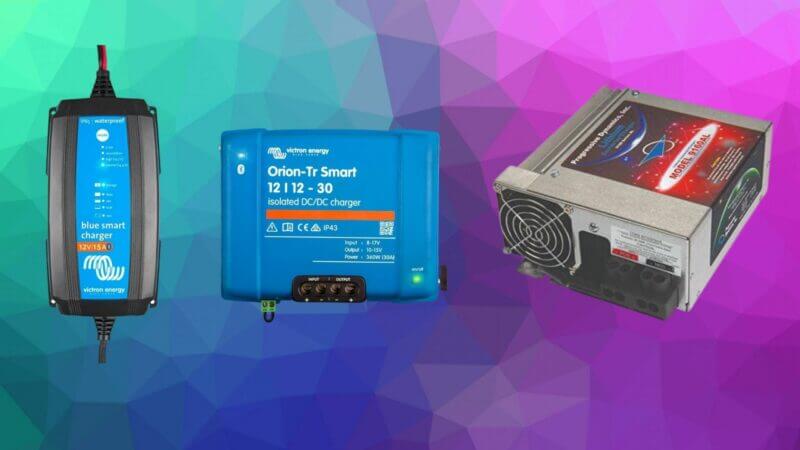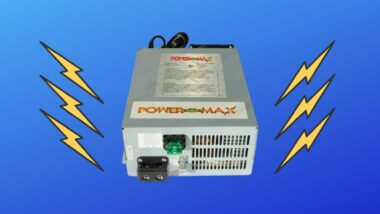Table of Contents Show
Many RVers have turned to lithium batteries’ advanced technology to support their power needs for many reasons. They have many benefits when compared with traditional deep-cycle lead-acid batteries. They weigh less, provide more power, have a longer lifespan, are maintenance-free, and are more environmentally friendly. You’ll also get a faster charge than with lead-acid batteries.
With all these benefits, suddenly, a lithium battery charger becomes essential. Let’s find out why!
What Is a Lithium Battery Charger?
Like the lead-acid charging system, a lithium battery charger is a voltage-limiting device that aids in batteries’ safe charging. But the similarities pretty much stop there.
The two battery types have different chemistry for creating energy, so they need corresponding chargers to meet those chemistry needs. Lithium battery chargers can safely charge lithium batteries at a much higher voltage (translation: faster charging!). At the same time, they give the chemical interactions within a longer lifespan (translation: fewer replacement batteries).

Can You Charge A Lithium Battery with a Regular Charger?
Can you? Absolutely. Should you? That’s a question that deserves a more detailed answer.
If you used a regular charger, the lithium battery would charge. However, it would charge far more slowly. Lead-acid chargers use a lower voltage by design. If they didn’t limit voltage significantly, batteries would overheat, leading to fire or even an explosion! But there’s more.
When considering lead-acid vs. lithium chargers, identify the voltage range of the two batteries. A resting lead-acid battery will reach full charge at 12.6V-12.8V. A resting lithium battery will not be fully charged until it reaches 13.3V-13.4V.
Because lead-acid chargers must use a lower voltage to charge batteries, they can only fill around 80% of a lithium battery, which is not good for the battery (nor for the RVer needing power!). It stresses lithium chemistry and reduces the battery’s lifespan.
So, not only will you need many more hours of charging time with a regular lead-acid charger, but you’ll also be damaging your lithium batteries in the process. These issues challenge two of the best benefits of lithium batteries!
Why You Need a Lithium Battery Charger
Lithium battery chargers will charge the corresponding batteries five times faster than a lead-acid charger. If that’s not reason enough to support this upgrade, let’s consider a few other factors.
The voltage of lead-acid deep-cycle batteries continuously falls as they discharge as well as with increased load.
That’s not true of lithium-ion batteries, which can provide peak power, as well as constant voltage no matter the load. A lithium battery charger aids the battery’s efficiency and storage process.
As mentioned previously, the voltage range of lead-acid vs. lithium batteries matters. Because a lead-acid battery is full at 12.7V-12.8V, most lead-acid chargers won’t start bulk charging again until the battery’s charge drops below 12.5V-12.7V. So, if you use a lead-acid charger for your lithium battery, you’ll have to use almost all of your lithium battery’s stored energy before a lead-acid charger starts charging it again.
What does this look like to the average RVer? Let’s use an example related to solar charging to illustrate.
Even if the sun is shining brightly, a lead-acid solar charge controller won’t start charging a lithium battery until the charge has dropped sufficiently. It will remain in float charge, and you’ll lose the benefit of the sun’s power to recharge your batteries during daylight hours!
This is just one of many examples showing you need a lithium battery charger if you use lithium batteries.
What to Look for When Selecting a Lithium Battery Charger
Consider several factors when selecting a lithium battery charger.
First, confirm that the input voltage (the voltage amount you intend to put into the battery bank at once) is not more than a particular charger can withstand. Otherwise, it will damage internal components.
Additionally, check the output voltage of the charger, which must be compatible with the battery. Voltage regulation is vital because lithium batteries are sensitive to over-voltage.
Next, consider the Amp-hour rating of your battery/batteries. You don’t want to buy a charger that has a lower Amp-hour rating than your battery does.
Finally, think about the cooling process the charger employs and the cost of the batteries because, well, cost always matters! You want the highest quality lithium battery and battery charger you can afford.
The Best Lithium Battery Chargers
Now that you have a rudimentary understanding of what a lithium battery charger does and its benefits, it’s time to go shopping. Here are our top recommendations:
Progressive Dynamics Lithium Battery Charger
- Reverse Battery Protection – Prevents charger damage if battery connections are accidently reversed
- Provides Filtered DC Power – Ensures proper lithium Battery Management System (BMS) operation
The Progressive Dynamics PD9160ALV lithium-ion battery charger is a well-reputed 60 Amp converter/charger. It provides filtered DC power, ensuring proper lithium battery management.
This unit electronically limits current to reduce voltage output automatically. In turn, it prevents overheating and component damage. It also employs automatic thermal protection to reduce the charger’s output to safe levels if the unit temperature rises too high.
This charger provides a Constant Current/Constant Voltage (CC/CV) charge as recommended by lithium battery manufacturers. You can connect it both in parallel and in series, and it has a reliable cooling fan that operates under high-load conditions.
Reviewers note that the installation of this unit is a breeze with two simple wire connections.
Victron BlueSmart IP65 Charger
- Take this water, dust, and chemical resistant charger with you wherever you go, whether it's on your boat, yacht,...
- This professional and innovative battery charger is equipped with a built-in Bluetooth feature. Using the Victron...
The Victron Blue Smart IP65 has a built-in BlueTooth, so you can easily monitor it from inside or outside your rig. Weighing less than two pounds, this powerful waterproof charger has a seven-step charging algorithm. It enhances the performance of your battery/batteries while maintaining their health.
When connected to a deeply discharged battery, this charger will force-feed it with a low current until it reaches the proper voltage. Then, regular charging will resume.
This charger comes with eyelets/ring terminals and crocodile clips for easy connection.
Reviewers love the Victron app’s functionality, which lets you see the charger’s cycle history. You’ll see a bar graph, and clicking on any of the bars will show you the duration and total Ah (Amp-hours) delivered during each stage!
Orion TR Smart Charger
- Victron Energy Orion-Tr Smart 12/12-Volt 30 amp 360-Watt DC-DC charger Isolated is a professional DC to DC adaptive...
- Suitable for both lead acid and lithium batteries, unlimited multiple units can be connected in parallel to increase...
The Orion TR Smart Charger is another three-stage charger (bulk, absorption, and float) with BlueTooth from Victron Energy. It’s suitable for 12V or 24V systems so that you can use it on either lead-acid or lithium batteries.
Victron makes these units available up to 400 Watts, and you can join multiple units to increase the power output.
Best of all, you can remotely monitor, program, and control it via Bluetooth. The Orion TR also has engine-running detection ability, so you can further conserve battery power.
In conclusion, there are many things to think about when considering a charger for your lithium batteries. But the most important thing you can do is use a lithium charger over a lead-acid charger every time!
Last update on 2024-07-26 / Affiliate links / Images from Amazon Product Advertising API









